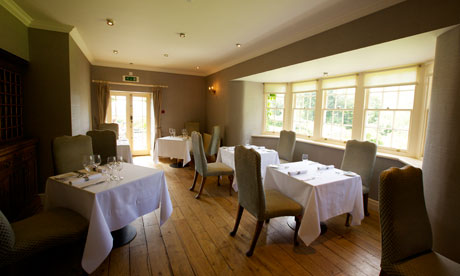
The Samling Hotel, positioned high on a hill above Windermere, is the kind of place where they vacuum the backs of the sofas. The front-of-house staff wear black suits as if they are primary-school certificates of achievement and the menus are so padded you could sleep on them. It is as if they feel the views, glimpsed from the narrow windows of the lounge and dining room, warrant all this. These are, to be fair, spectacular: the rippled mercury of the lake beneath an occluded Cumbrian sky; the tree-heavy hills coming down to dip their shoulders in the waters; the pointed smudge of a sailboat, like something out of a child's picture book.
They have responded to all this with what they call – dread phrase – fine dining, or more particularly "faine dining", in which things are done not to make things pleasurable but because some bunch of pointless, stupid, long-forgotten codes demands it. Who really wants to be treated like this? No enquiry on arrival as to whether you might like to go straight to the table. Through to the wood-panelled lounge you must go. Suited man trots off. Back again, to offer a drink. Trots off again. Pause. Very long pause. Stare at view. Notice they vacuum the backs of the sofas. A waiter starts heading across the room in a businesslike manner. There are only six people in the whole place. I can't quite imagine what needs attending to so swiftly. Can we, I ask, have the menus please. The answer to this question is "yes". It's not: "The menus will be with you presently."
Oh for God's sake. This is tiresome. It's tiresome the way having a corn removed is tiresome. It's not unbearably uncomfortable, but it does bloody well go on. All of it would be justified if the food was something truly exceptional, but it really isn't. It's not bad. But it isn't worthy of the sort of flummery that sucks the life out of you.
Sometimes, in places like this, you have to treat what you are being given as you would those complicated fractions that you were instructed to simplify at school, by scratching out all the irrelevant stuff. Here you cross out the pointlessly irritating use of slates for plates, engraved with the word "Honister" on the front, the name of the slate mine they came from. I hate slates and really don't care where you got them from. You discount the sharp knife work, the occasional outbreak of foam, and the relentless enquiries by the waiters as to how everything is. So what you are left with, for £25 at lunchtime, is three courses of very basic bistro cooking.
Scrape off the unpleasantly tart orange foam from the tea cup of amuse bouche, and underneath you find a perfectly fine carrot soup. My mouth barely cracked a smile. A (strikingly small) portion of pork terrine is OK but not worthy of the huge lunar stretch of slate it arrives on or the diced fruit punctuating it.
A battered and deep-fried cod cheek is oversalted and lies on a ho-hum mess of peas and sweetcorn. There's a tiny lump of pork belly with some perfectly acceptable mashed potato, and another plate of seared fish – plaice? Sea bass? My attention wandered – on some lentils and beans.
We finish with a slice of chocolate torte and a crème brûlée with some soft, undercooked biscuits. This, bar the vegetarian options, which are no more imaginative than a risotto, is the entire lunchtime menu.
In the evenings, when eventually even the view would be taken from you, the food costs £50 for three courses. What doubling the cost gets you I cannot say, but presumably you get the same staff and they will do their best to make sure the experience ain't much of a laugh.
Finally, a word on the wine list. It is an endless parade of triple digits, plus a few shameless peaks from the boom times, namely a 1989 Petrus for £8,000. You can get that online for around £3,000. Something to think about while studying the view.

